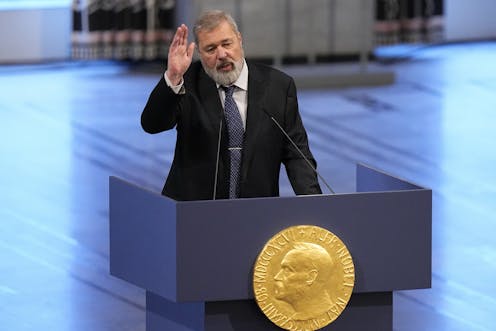how Russia's journalists, writers and artists are turning silence into speech
- Written by Jacob Edmond, Professor of English, University of Otago

“It is impossible to stop a speeding train by throwing oneself onto the tracks,” wrote Russian poet Dmitry Kuzmin[1] back in March. He was commenting on Olga Gordienko, a young teacher who, before she was arrested, stood for several minutes on a Moscow street with a sign that read:
At least don’t lie to yourself. War is death. Enough of this bloody fight for peace!
While acknowledging the teacher’s bravery, Kuzmin warned protestors to take care. Change would not come through such isolated acts, however admirable.
What would you do if your country launched a war of aggression, causing tens of thousands of deaths and displacing millions? What if the price of protest or even posting objections on social media was arrest and imprisonment?
What if you knew that over the past decades many of your country’s most outspoken journalists had been killed for refusing to the toe the government line? What if even mentioning the word “war” online, in print, or on the street was illegal?
Would you speak out, or keep quiet and bide your time?
These are the difficult questions facing those Russians who oppose Vladimir Putin and his invasion of Ukraine. They are, of course, nothing compared to what Ukrainians face as their country is brutalised, their towns destroyed, their people raped and murdered. But they are still important questions for the future of both countries and the world at large.
They are questions of ethical, familial, and national obligations. They are questions of personal risk, strategy and tactics. They are questions about how best to speak through silence.
One powerful if all too brief example of how silencing can be turned into speech is Novaya Gazeta[2], the independent Russian news outlet that held out longest against the new censorship regime. It did so, strangely enough, by seemingly agreeing to be silenced.
On 4 March, just eight days after Russia began its invasion of Ukraine, Putin signed into law legislation criminalising the “public dissemination of deliberately false information about the military forces of the Russian Federation”.
Images and news of Russia’s brutality in Ukraine were condemned as “feki” (fakes), a term borrowed from English that suggests not just deceptiveness but also the influence of what the Russian government likes to call “foreign agents”.
Already under extreme pressure from the authorities,, and now faced with the threat of 15 years imprisonment under the new law, most independent Russian media outlets either shut down operations or moved them abroad. Those that continued to operate had their websites blocked.
For around a month, however, Novaya Gazeta adopted a different strategy. It continued to report on the war using the official euphemism “special operation”, accompanied by parenthetical comments to the effect that “you know what we mean, but we are not allowed to say it”.
Censorship and absurdity
Far away in Aotearoa, New Zealand, I followed this cat-and-mouse game with the authorities, as the newspaper attempted to carry on its work while adhering to the letter of the new censorship laws.
Throughout March, Novaya Gazeta held up official lies for ridicule. The Russian government had insisted that there were no conscripts amongst the invasion force. A headline reported that Russian conscripts were being withdrawn from Ukraine “where they never were”.
Novaya Gazeta deployed a similarly absurdist use of blanks to mark the silencing of any mention of the war:
Asked whether he is ready to stop the ___ , Putin answered “no”.
When journalist Marina Ovsyannikova[3] interrupted a live Russian Channel One news broadcast to display a sign protesting the war and the official lies, Novaya Gazeta reported this brief puncturing of the official reality by showing an image of Ovsyannikova’s sign with all the words blanked out except the line “Don’t believe the propaganda.”

















